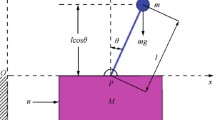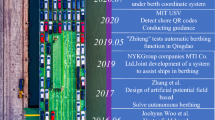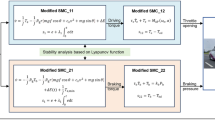Abstract
This paper presents a robust adaptive nonlinear feedback algorithm based on error-driven function for ships course-keeping which are subjected to the unknown time-varying disturbances, uncertain ship model parameters and control saturation. Nonlinear feedback and adaptive techniques are used to design the control law. The error-driven function is designed to avoid the input saturation and adjust the control gain. The designed adaptive law not only achieves the self-regulation of course-keeping control system but also adjusts parameters adaptively. In addition, the Lyapunov direct method is utilized to analyze the stability of course-keeping system. Theoretical analysis indicates that the designed control law can achieve the ship course-keeping while ensuring that all signals are bound. Finally, the effectiveness of the developed control strategy is demonstrated by simulations and comparative results.



Similar content being viewed by others
References
Zhang XK (2012) Ship motion concise robust control. Science Press, Beijing, pp 1–15
Skjetne R, Smogeli O, Fossen TI (2004) Modeling, identification and adaptive maneuvering of Cybership II: a complete design with experiments. Proc IFAC Conf Control Appl Marine Syst 2004:203–208
Ge SS, He W, How BVE, Choo YS (2010) Boundary control of a coupled nonlinear flexible marine ris. IEEE Trans Control Syst Technol 18(5):1080–1091
Do KD, Jiang ZP, Pan J (2003) Robust global stabilization of underactuated ships on a linear course: state and output feedback. Int J Control 76(1):1–17
Zhang ST, Guang R (2005) Fuzzy adaptive control for ship steering autopilot based on backstepping technique. J Traffic Trans Eng 5(4):72–76
Le M-D et al (2003) A new and effective fuzzy PID autopilot for ships. Inst Electr Electron Engineers (IEEE) 3:1411–1415
Le M-D et al (2004) Study on a new and effective fuzzy PID ship autopilot. Artif Life Robot 8:197–220
Feng YX, Zhang XK (2018) Ship course keeping control based on nonlinear decoration fuzzy PID. Ship Eng 40(1):202–205
Dlabač T et al (2019) PSO-BASED PID controller design for ship course-keeping autopilot. Brodogradnja 70(4):1–15
Li G, Guo C, Li Y, Deng W (2015) Fractional-order PID Controller of USV course-keeping using hybrid GA-PSO algorithm 2015. In: 8th International Symposium on Computational Intelligence and Design (ISCID), p 506–509
Ri-Fan J, Xian-Ku Z (2018) Grey prediction–based concise robust control of ship course-keeping. J Dalian Polytechnic Univ 37(1):63–66
Liu H, Ma N, Gu XC (2018) Ship course following and course keeping in restricted waters based on model predictive control. TransNav Int J Mar Navig Saf Sea Transp 12:305–312
Xia GQ, Luan TT (2015) Study of ship heading control using RBF neural network. Int J Control Autom 8(10):227–236
Bai YM, Cao YC, Li TS (2019) Optimized backstepping design for ship course following control based on actor-critic architecture with input saturation. IEEE Access 7:73516–73528
Zhang XK, Zhang Q, Ren HX, Yang GP (2018) Linear reduction of backstepping algorithm based on nonlinear decoration for ship course-keeping control system. Ocean Eng 147:1–8
Zhang Q, Jiang N, Hu YC, Pan DW (2017) Design of course-keeping controller for a ship based on backstepping and neural networks. Int J e-Navig Maritime Economy 7:34–41
Zhang Q, Zhang XK (2017) Nonlinear improved concise backstepping control of course keeping for ships. IEEE Access 70(06):1–8
Songlin Hu, Yue D, Xie X, Ma Y, Yin X (2018) Stabilization of neural-network-based control systems via event-triggered control with nonperiodic sampled data. IEEE Trans Neural Netw Learn Syst 29(3):573–585
Swaroop D, Hedrick JK, Yip PP, Gerdes JC (2000) Dynamic surface control for a class of nonlinear systems. IEEETrans Autom Control 45(10):1893–1899
Zhang Q, Hu YC, Wang AQ et al (2017) Nonlinear adaptive control algorithm based on dynamic surface control and neural networks for ship course-keeping controller. J Appl Sci Eng 20(2):157–164
Zhang YX, Su DM, Xu HJ, Yong L (2017) Ship course-keeping control and design. Ship Sci Technol 39(10):64–66
Liu Z, Gu W, Gao D (2016) Ship course keeping using eigenvalue decomposition adaptive sliding mode control. Techno-Ocean Kobe 2016:687–691
Hu SL, Yue D, Yin XX, Xie XP, Ma Y (2016) Adaptive event-triggered control for nonlinear discrete-time systems. Int J Robust Nonlinear Control 26(18):4104–4125
Zhang ZH, Zhang XK, Zhang GQ (2018) ANFIS-based course-keeping control for ships using nonlinear feedback technique. J Mar Sci Technol 2018:1–8
Zhang XK, Zhang GQ (2016) Design of ship course-keeping autopilot using a sine function based nonlinear feedback technique. J Navig 69(02):246–256
Ma C, Zhang XK (2017) Ship course keeping control based on nonlinear feedback of exponential function. Ship Eng 39:162–165
Hu S, Juang J (2011) Robust nonlinear ship course-keeping control under the influence of high wind and large wave disturbances. In: 2011 8th Asian Control Conference (ASCC), Kaohsiung, pp 393–398
Yang PH, Hu SS, Su CM, Juang JY (2000) Nonlinear H ∞ control theory applied to ship course-keeping problem. Chin Autom Control 2000:688–693
Zwierzewicz Z (2014) On the ship course-keeping control system design by using robust and adaptive control. In: 2014 19th International conference on methods and models in automation and robotics (MMAR), Miedzyzdroje, pp 189–194
Liu ZQ (2017) Ship adaptive course keeping control with nonlinear disturbance observer. IEEE Access 5:17567–17575
Sun XF, Chen WS (2016) Global generalized exponential/finite-time control for course keeping of ships. Int J Control 89(6):1169–1179
Jia XL, Yang YS (1997) Mathematical model of ship motion. Dalian Maritime University Press, China
Fossen TI (2011) Handbook of marine craft hydrodynamics and motion control. Wiley, Hoboken
Zhang XK, Jin YC (2013) Control system modeling and digital simulation. Dalian Maritime University Press, Dalian
Li JF, Li TS (2013) Direct adaptive neural network tracking control with input saturation. J Appl Sci-Electron Inf Eng 31(3):294–302
Kallstrom CG (1982) Identification and adaptive control applied to ship steering. Ph. D. Thesis. Lund Institute of Technology, Lund, Sweden
Wang HD, Wang QR, Yan L, Wu XZ (2014) A new robust adaptive backstepping for ship course-keeping control. Appl Mech Mater 536–537:793–979
Zhang Q, Zhang XK, Im NK (2017) Ship nonlinear-feedback course keeping algorithm based on MMG model driven by bipolar sigmoid function for berthing. Int J Naval Archit Ocean Eng 9(9):525–536
Zhang GQ, Zhang XK, Zheng YF (2015) Adaptive neural path-following control for under actuatedships in fields of marine practice. Ocean Eng 104:558–567
Acknowledgments
The authors would like to acknowledge the National Natural Science Foundation of China (61873071, 51911540478, G61773015), key research and development plan of Shandong province (2018GGX105014, 2019JZZY020712), Shandong Jiaotong University PhD Startup Foundation of Scientific Research and Shandong Jiaotong University “Climbing” Research Innovation Team Program (SDJTUC1802).
Author information
Authors and Affiliations
Corresponding author
Additional information
Publisher's Note
Springer Nature remains neutral with regard to jurisdictional claims in published maps and institutional affiliations.
About this article
Cite this article
Zhang, Q., Zhang, M., Hu, Y. et al. Error-driven-based adaptive nonlinear feedback control of course-keeping for ships. J Mar Sci Technol 26, 357–367 (2021). https://doi.org/10.1007/s00773-020-00741-6
Received:
Accepted:
Published:
Issue Date:
DOI: https://doi.org/10.1007/s00773-020-00741-6




